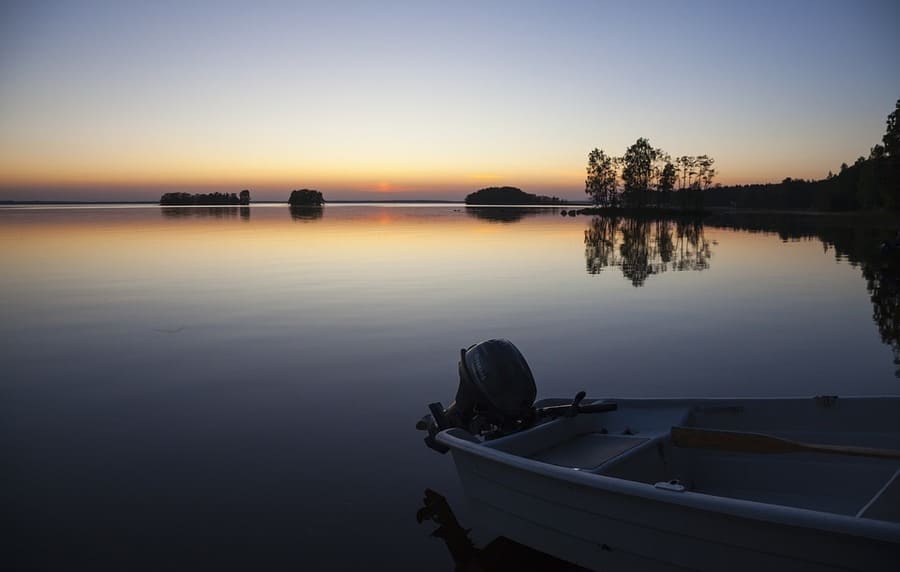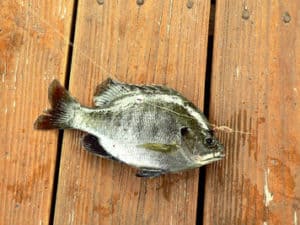Do Bluegill Bite at Night? (Tips, Bait, Spots, How-to, etc.)
Leave a comment after this article and let’s talk more about bluegill fishing. I’d love to read your feedback.
Bluegill are most active during the day, but they will bite at night. Bluegill are much less active at night. Many variables play a factor but if bluegill feel secure in their safety, they will feed well into the night.
This answer is more complex than many folks realize. Read on to learn the complete truth about bluegills biting at night. Check out this helpful guide on the best water temperature to catch bluegill seasonally.

Table of Contents
Do Bluegill Bite at Night?
Bluegills are very active in the late afternoon right until around sunset. Once darkness settles over the land, bluegills retreat to shelter and try to rest until morning comes.
Bluegills are a favorite food source for many aquatic predators and nighttime is a prime hunting time. As a result, most bluegills will forgo the opportunity to feed in order to avoid becoming food themselves.
Bluegills will certainly eat if opportunity presents itself. Since bluegills are so shelter driven at night, they won’t leave the safety of cover to eat. Food needs to venture close by for them to consider eating it.
Bluegills will bite at night but only if you present your bait right to them. Don’t expect them to work for your bait.
Click here for a complete breakdown of ice fishing for bluegill at night.
Nighttime Diet

At night, bluegills consume freshwater shrimp, minnows, and insects which are more active after dark than during the day.
Once the sun goes down, some prey items really come alive. Insects like mosquitoes, midges, and moths are ever abundant at night. Small fish like minnows and shiners will school up to avoid being eaten.
These small fish are attracted to the surface in pursuit of small insects. Another prey item that comes alive at night are freshwater shrimp. These small creatures are abundant in many eastern and southeastern waters.
Bluegills prefer to hunt their prey by day but they will consume freshwater shrimp, small minnows, small shiners, and insects that present themselves.
Best Time to Fish for Bluegill
The best time to fish for bluegill is during the early morning or late evening when they are most active. Bluegill feed more aggressively during these times as they search for food near the water’s surface. Additionally, fishing during the cooler months and in shady areas can also increase your chances of a successful catch.
Nighttime Bluegill Activity
Bluegills are typically inactive after dark. At night, they are focused on resting and shelter. Predatory fish like walleye and catfish become very active in the dark.
Bluegills are preferred meals for both nocturnal hunters. While bluegills would love to get a meal, they are more focused on not becoming one themselves.
You can typically find bluegills bunched up together near prominent structure like dams and tree limbs. You can also find them among lily pads as they wait out the night.
They will absolutely eat at night but the prey will need to come to them. They are unlikely to risk being eaten to venture out of shelter after prey.
Can Bluegills See in Dark?
Even though bluegills are inactive at night, they actually do have pretty good night vision. They have large eyes that help absorb limited light and amplify objects to visible status.
They developed this good night vision more for defense than feeding. It evolved out of necessity. Bluegills are a favorite food source for a variety of fish to include catfish, bass, pike, walleye, and even yellow perch. Snakes, turtles, and otters are also huge predators of bluegills.
Many of these predators are very active at night will gobble up unsuspecting bluegill. Bluegills developed their ‘night sight’ to enable them to locate and maneuver away from predators.
Bluegills do not possess the intense night eyesight that walleye do, but they can see enough to spot prey and predators approaching.
Pick the Right Season
From personal experience as well as reading up on the topic while researching this article, I’ve concluded the season bluegills bite at night the most is during the summer.
To go even further into this, mid-summer, when the summer days are at their hottest, will see the most bluegill feeding occur into the night hours.
This is because bluegills spend so much of their day hunkered down trying to avoid the hot sun. By the time it cools enough for them to venture out in search of food, it’s almost sunset.
In order for bluegills to sustain their metabolism and size, they still need to consume meals daily. This drive will lead them to risk possibly getting eaten by predators in order to get their requirement of food.
How to Fish for Bluegills at Night
In order to catch bluegills at night, throw live bait such as minnows, freshwater shrimp and worms as close to prominent cover as you can.
Putting a burley or tossing some corn starch can help draw in many fish to your area. Lastly, the addition of artificial lights will draw in both insects and fish beneath the surface.
Cast your lines either into the prominent cover or at the edge of darkness around your light as these are areas where big bluegills will linger.
Best Night Bluegill Baits
For night fishing, bluegills respond well to small slow-moving baits like shrimp, worms, minnows, aquatic insects, and tadpoles. These baits will work very well during the day but can also be effective nighttime baits too.
You can also use corn, cornmeal, bread, and cheese as well. Each of these bait options are inexpensive to buy and very user-friendly. You can fish with these and experience great results if you place these baits right in front of a willing fish.
One artificial bait I’d like to highlight for nighttime use is Berkley PowerBait. In my experience, this paste is every bit as effective as most live bait options.
Nighttime Bluegill Fishing Tips
1. Live Bait
When it comes to nighttime fish for bluegills, live bait is your best option. Bluegills will not venture out of shelter to pursue a lure. I mean they might but very rarely will this occur.
If you really want to succeed, you must present them with attractive live bait and place it right in front of them.
2. Fish Tight to Cover

Bluegills will not leave shelter at night. There are too many dangers waiting for them out in the open. If you have any shot at getting a bluegill to bite, you’ll need to fish tight to cover like docks, dams, logs, and vegetation.
Rarely will a bluegill venture more than a foot or two away from cover at night.
3. Be Patient
This one is important. Day time bluegill fishing is action-packed with rarely a dull moment. Night bluegill fishing is the exact opposite. It can take long hours of perseverance and a little luck to land a couple bluegills.
Just be patient and your work will pay off. While you let your bluegill baits soak, you can also cast for catfish and walleye to kill the boredom.
4. Artificial Light
Fish are attracted to light sources. Artificial light attracts insects and plankton which attract baitfish and game fish a like.
Dock lights, boat lights, and even floating crappie lights are excellent ways to lure in game fish. Big bluegills will often hover just outside the range of the light looking inwards. This is where you should cast your line.
5. Don’t Fish Beyond 10 PM
Bluegills will bite after sunset for a few hours. Don’t waste your time after 10 pm though. My advice is switch to walleye or catfish fishing or just go home.
6. Pick the Hottest Days
The hottest summer days will be the ones where bluegills are most active feeding after sunset.
7. Burley or Attractant
Create a burley or toss some cornmeal in the water at night to draw in baitfish and bluegills.
8. Seek Water without Predators
If possible, fish water with only bass or pike as the primary predators of bluegills. Both bass and pike are largely inactive at night. This means bluegills would be more willing to leave shelter at night to feed.
9. Don’t Skip Deeper Water
Bluegills may actually be down deep at night around cover like boulders or even boat wrecks.
10. Calm Nights
Calm water and windless nights seem to produce better results for bluegills than the opposite.
Related Questions
What is the best time of day to catch bluegills?
The best time of day for bluegill fishing is late evening right up until sunset. During these hours, water temperatures will be cooler, aquatic insects will become more active, and the sun’s direct rays will be far less oppressive.
The sun rays in particular cause bluegills to hold tight to cover during midday. By late evening, these lose their grip on the bluegills who can now venture freely without being blinded by the glare from above. Fish for bluegills right before sunset.
Can you catch bluegill at night?
Bluegill can be caught at night. Bluegill are known to be more active during the day, but they can still be caught after dark. Using artificial lures or live bait such as worms or crickets can increase the chances of catching bluegill at night.
When do bluegill stop biting?
Bluegill typically stop biting in colder months when water temperatures drop below 50°F. They become less active and seek deeper waters for warmth. However, the exact timing can vary depending on the region’s climate. It’s best to check local fishing reports or consult with experienced anglers for the most accurate information on when bluegill stop biting in a specific area.
Do bluegill sleep?
Bluegill fish do not sleep in the same way as humans do. They remain in a state of rest during the night, but are still alert and responsive to their surroundings. This behavior allows them to conserve energy while staying ready to detect any potential threats or prey.
